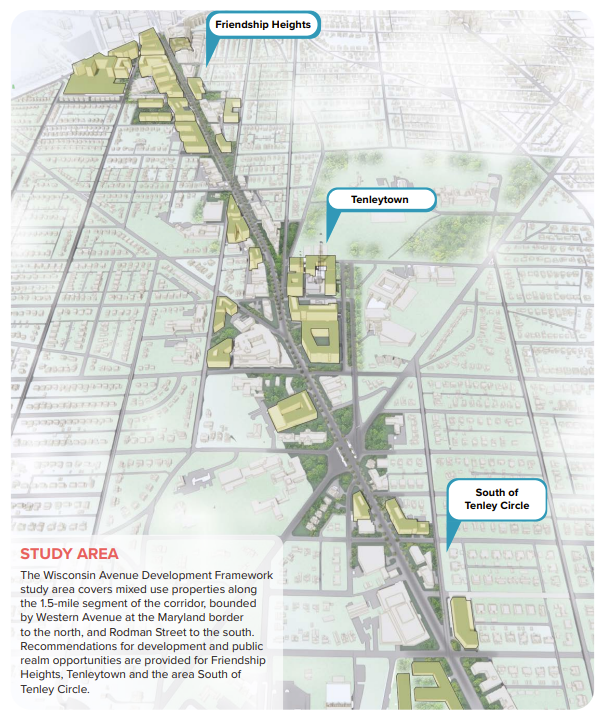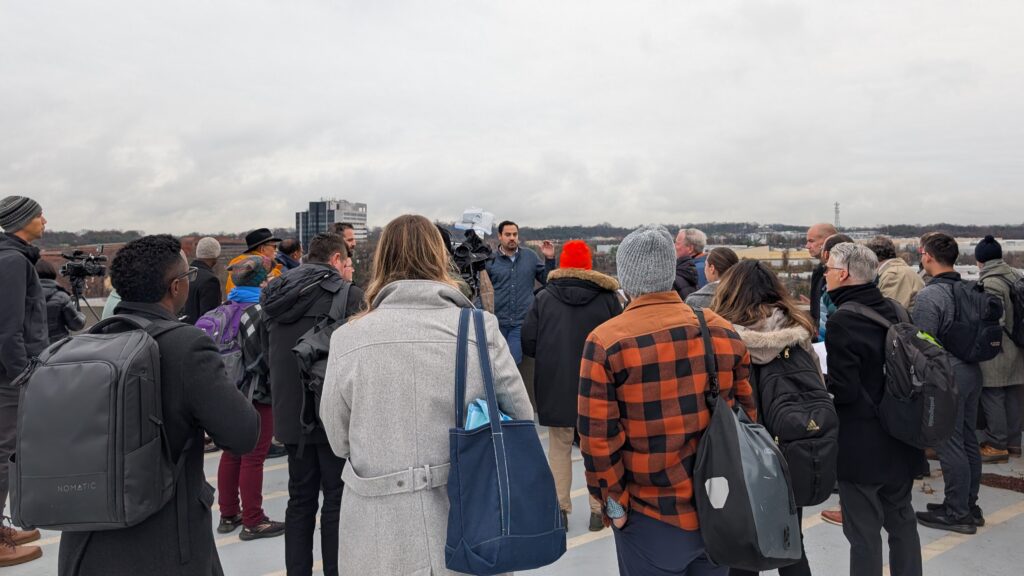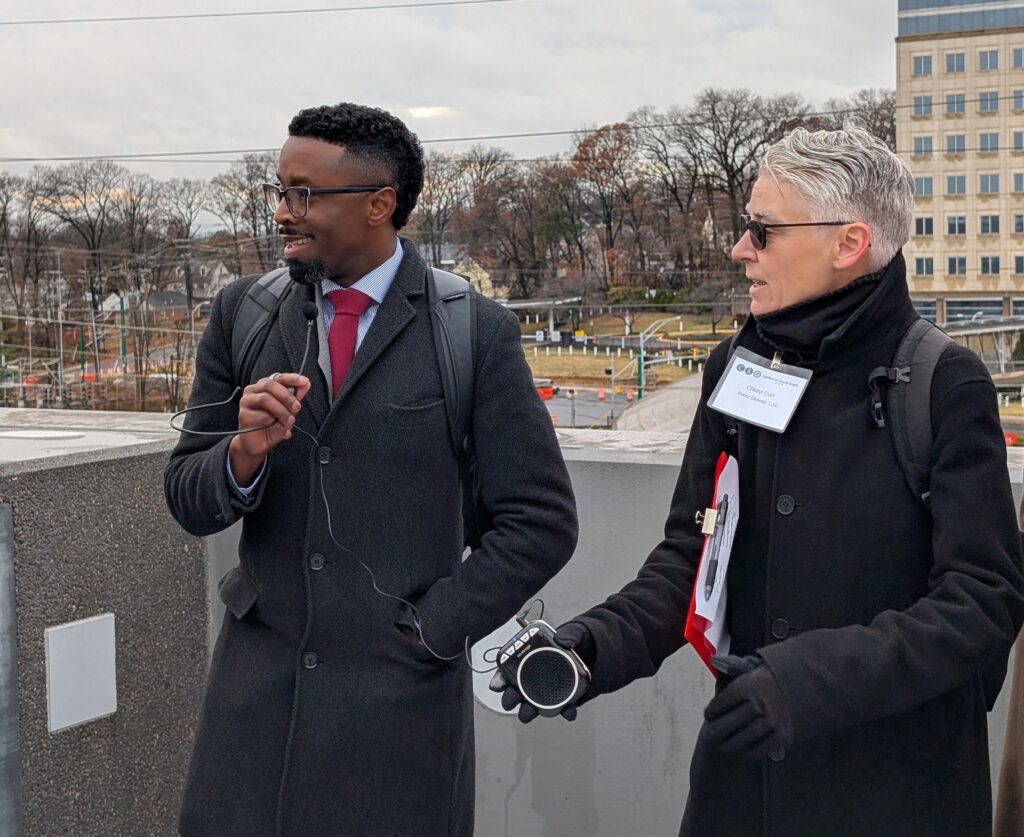Stewart Schwartz, executive director of the Coalition for Smarter Growth, offered a statement to the Fairfax County Times on the tools needed to ensure affordable housing.
Category: Transit-Oriented Development

Housing bills at the VA General Assembly
We are pleased to report that many of our bills have already passed their chambers of origin, meaning they have crossed over and will now be considered by the opposing chamber. Read on to see where these bills stand and how you can be a part of supporting housing affordability in Virginia.

Release: Happiest commuters? Those who use transit, walking, biking and carpools. Least happy commuters? Those who drive alone
2025 State of the Commute Survey results released

Take Action: Tell the DC Zoning Commission to upzone Wisconsin Ave. from Friendship Heights & Tenleytown Metro stations
On December 11, 2025, the DC Zoning Commission will consider a major upzoning for the upper Wisconsin Avenue corridor near the Friendship Heights and Tenleytown Metro stations (Zoning Case 25-13) which could bring thousands of much-needed homes to this high opportunity area.
Voice your support for a more inclusive Ward 3! The opponents are coming out strongly against it – so we need you to step up! Here’s how:
- Send a letter of support by December 10 — click below & personalize it!
- Sign up to testify virtually on 12/11, 4 pm. Live, virtual testimony at the Zoning Commission is crucial to countering the number of forceful opponents we expect. Sign up & get tips on testifying here. Or ask us! Cheryl@smartergrowth.net.
The upper Wisconsin Avenue Corridor with two Metro stations and many local services is the perfect place to provide the housing our city needs.

Image source: DC Office of Planning
Want more background on the Wisconsin Av. rezoning? Check out our explainer here.

New Carrollton station area walking tour
On Dec. 2, 2025, we met up to take a look at what’s been happening around the New Carrollton Metro station. It’s a Metro station, a bus station, an Amtrak station, a MARC station, and coming soon: a Purple Line station! We got a bird’s eye view from the top of the Metro parking garage and saw lots of progress and preparation for new housing, transit facilities, and even a bit of retail around the New Carrollton Metro station. Check out the Metro handout on all the building around the Metro station.
Tour Speakers:
Nia Rubin, Acting Vice President, Office of Real Estate and Development, WMATA
Matt Sanchez, Director of Development, Urban Atlantic Development
Vic Weissberg, Prince George’s County Dept. of Public Works and Transportation
Karen Guzman, Office of Prince George’s District 3 County Council Member Eric Olson
Ray Biggs, II, Senior Project Director, Purple Line, Maryland Transit Administration
Scott Gottbreht, PhD, Assistant Secretary of Policy, Maryland Dept. of Housing & Community Development
Alan Lederman, Managing Director of Development, Urban Atlantic Development

Pictured: Matt Sanchez, Urban Atlantic, speaks to the group, overlooking the site for the new affordable senior building located across Garden City Drive. Photo by Dan Behrend.
Co-sponsors: CSG, WMATA, MDOT & RISE Prince George’s

Pictured: Ray Biggs, II, Senior Project Director, Purple Line, Maryland Transit Administration, and Cheryl Cort, CSG. Background: Purple Line station under construction and the IRS building.
Testimony: Support for rezoning the RiverHouse site to enable transit-oriented infill development (VA)
We are testifying in support of rezoning the RiverHouse site to enable compact, pedestrian-friendly and transit-oriented infill development.
DC Testimony Workshop: Preparing for Wisc. Ave. Rezoning
Date: Nov. 10 2025, 7 – 8:30 pm
AGENDA
Introductions – name, neighborhood, motive
How to testify
- Sign up & what to expect at virtual hearing 4pm, ~5pm proponents start
- Principles for testifying
- Proponent with or without recommended improvements
- What’s motivating you to be here
- Tell your personal housing story, don’t worry about details, don’t be an expert
- Dos/Donts – don’t oppose because it’s not good enough, instead support & urge to make it better; do make it personal rather than being an expert; only speak for allotted 3 minutes; always be polite & respectful of commissioners & all others – including opponents; don’t worry – Commissioners want to hear from you they are not are not out to get you
- Sample testimony- below
Peter Shapiro – How to have the most impact
How to testify – check in
- Ask participants: What’s your main argument – why do you care about approving this upzoning? (one sentence)
3. Q & A – resource people
Resources
Testimony: Support for compact, mixed-use, and transit-oriented development on Potomac Yard Landbays G and H (VA)
We are testifying in support of the requested amendments to enable compact, mixed-use, pedestrian-friendly and transit-oriented development on Potomac Yard Landbays G and H.
CSG in the News: Planning commission approves Potomac Yard amendments to enable final development phase
“Between April 2024 and 2025, average home prices in Alexandria rose by 10.5 percent and in that time, over 93 percent of residents making below $50,000 per year are housing cost burdened,” wrote Becca Dedert of the Coalition for Smarter Growth.

What to know about the University Boulevard Corridor Plan — and how you can help
The University Boulevard Corridor Plan lays out in detail how we can achieve safer streets, a wider and more accommodating variety of housing options, and greater environmental resilience.
